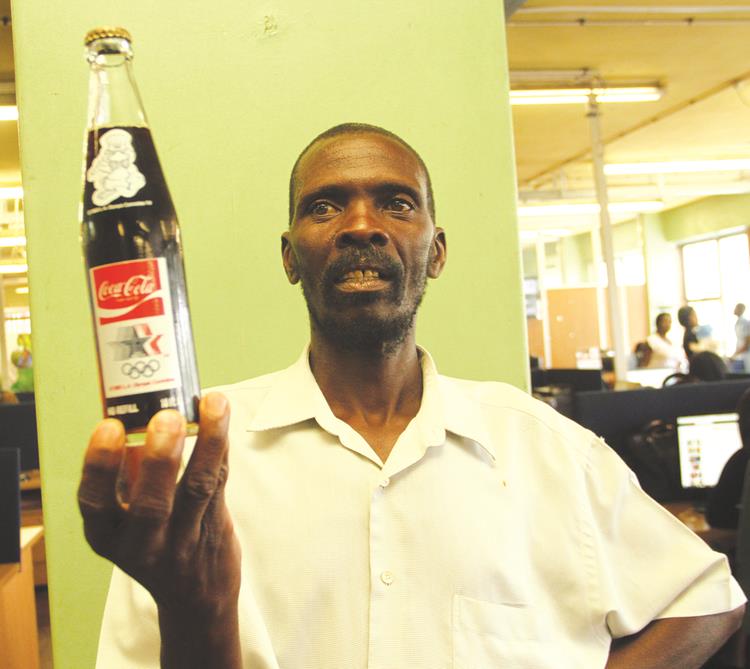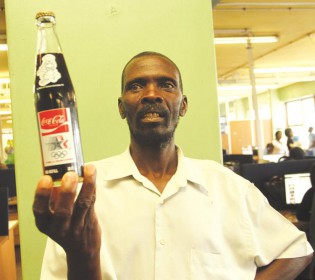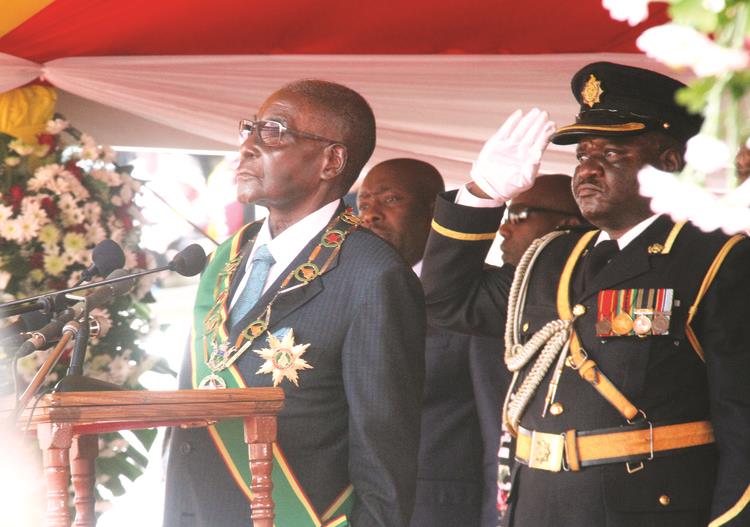It’s no longer the real thing for Lazarus


VINTAGE . . . Seasoned long-distance runner Tommy Lazarus displays a bottle of Coca-Cola which was presented to him as one of the participants of the 1984 Los Angeles Summer Olympic Games in the United States where he represented Zimbabwe in the men’s marathon event. Lazarus has kept the bottle for the past 33 years as a souvenir but he now wants to auction it
Ellina Mhlanga Sports Reporter —
FOR many athletes being part of the Olympic Games is just a dream and if it comes true, it’s a dream one would remember for the rest of his or her life as it comes with a lot of memories both on and off the field.
For former Zimbabwe long-distance runner Tommy Lazarus, it’s a dream that came true in 1984 when he took part at the Los Angeles Games in the United States.
And one of the things that he has kept as a reminder of those Games is commemorative Coca-Cola bottle they received as a gift during those Games. But sadly has now decided to part with his treasured bottle as he tries to earn some money for himself.
“We were given the bottles in 1984 as a commemorative gift at the 1984 Olympic Games in Los Angeles. I have kept it since 1984 to date.
“It meant a lot to me. It was a gift one will remember till death, show it to your grandchildren that this is something I got when I went to America in such a year.”
But the question that comes to mind is: Why would he want to let go of something he treasured that much and have kept for the past 33 years?
“I need some money. I think I have kept it enough. I know I might not get much from it but I think it can assist me in some way.
“To be honest if I was financially stable I would not have thought about selling it. But life is becoming difficult every day. Now I am a farmer, I have a four hectare plot and I am sharing it with my family.
“It took me two to three years to make this decision to sell this bottle. I am also afraid I might lose it. If it was a medal, I could have kept it but this can break anytime,” says the father of five.
While Lazarus seem to believe he can earn a lot from the bottle he might be in for a disappointment as the bottle and its contents is valued between $22.95 on Amazon and $30 for a new bottle on eBay.
“I just want to negotiate, I do not have a prize at the moment, and it’s a bit difficult to come up with a prize.”
Early this year there were reports on former Soviet gymnast and Olympic gold medallist Olga Korbut, who sold several of her medals at an auction. According to the BBC, the sale of seven lots, including two gold and a silver from the 1972 Munich Olympic Games, fetched $183 300.
And the difference is that for Lazarus, who did not finish the 42km race he competed in at the 1984 Los Angeles Games because of stomach cramps, it’s just a commemorative Coke bottle he got as a gift but hopes to raise some money through it.
The former long-distance runner appealed to the local authorities and corporate world to support promising athletes. “I wish we could have more sponsors that would come together to ensure proper welfare for athletes. Usually when you can no longer compete that’s the end of you.
“You just have a bottle of Coca-Cola like the one I brought here then you are out. You don’t have anything to do, you can’t even afford a pair of shoes.
“We need support from the companies and whoever wants to help sport, those with insurance companies can come in to assist in the event of injuries so that you have something in the event of such misfortunes or at the end of your career.
“Sometimes you don’t have anything to invest in because you have a family to look after, that’s why some end up taking up many races. Sometimes it’s difficult to solely rely on races, there are issues of injuries also,” said Lazarus, who is now based in the Matepatepa area in Bindura.
The 57-year-old, who used to compete alongside the likes of Esau Magwaza, Tapfumaneyi “Tap Tap” Jonga, Patrick Nhauro, Melusi Ndhlela, James Mutshipisi, Naboth Mudzviti and Victor Mudewe in the early 1980s, believes their generation lacked proper guidance.
“The coaching is improving unlike during our time, you could run 10 marathons the same year, which means you would get worn out. But now with the coaches and experts, athletes have got professional guidance,” said Lazarus.











Comments